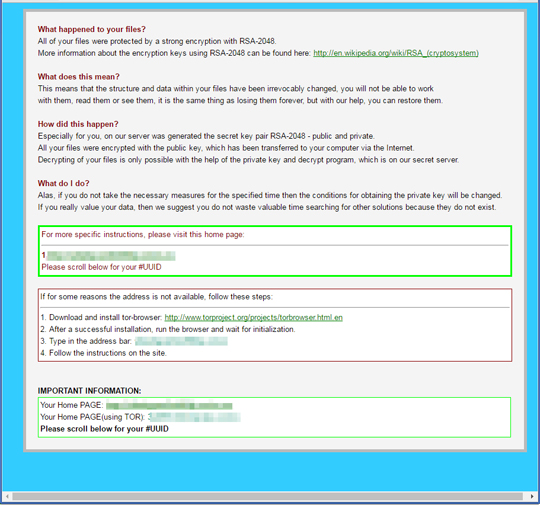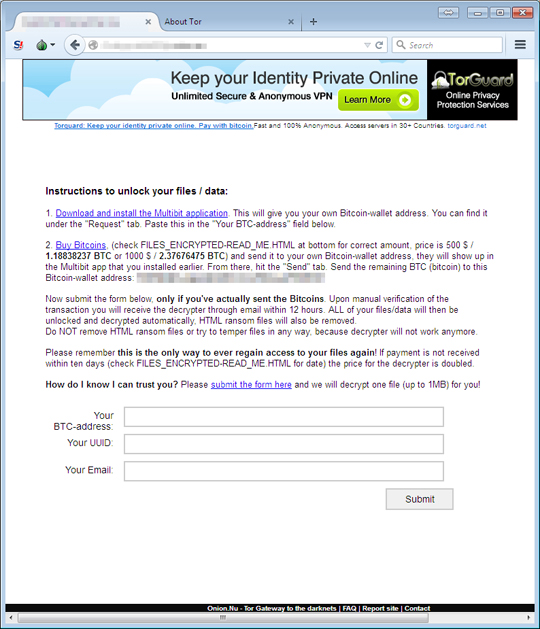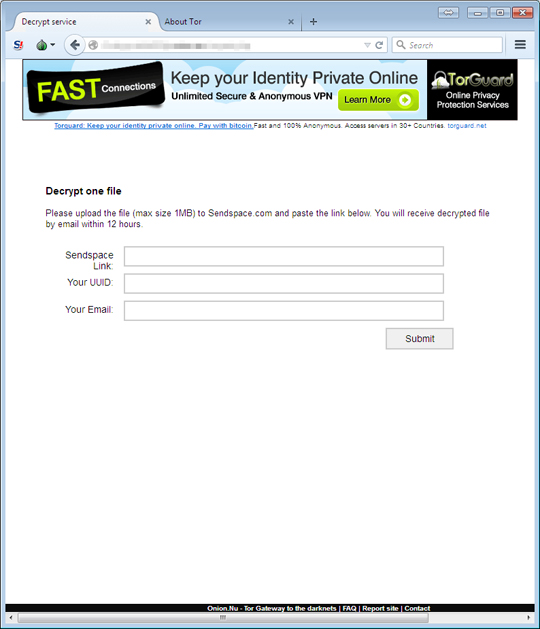RANSOM_POWERWARE.A
Ransom:PowerShell/Powerware.A (Microsoft), Trojan-Ransom.PowerShell.Agent.a (Kaspersky), PowerShell/Filecoder.F (ESET)
Windows


Threat Type: Trojan
Destructiveness: No
Encrypted: No
In the wild: Yes
OVERVIEW
Downloaded from the Internet
This Trojan arrives on a system as a file dropped by other malware or as a file downloaded unknowingly by users when visiting malicious sites.
It connects to certain websites to send and receive information. It gathers information and reports it to its servers.
TECHNICAL DETAILS
Varies
Script
No
29 Mar 2016
Connects to URLs/IPs, Encrypts files
Arrival Details
This Trojan arrives on a system as a file dropped by other malware or as a file downloaded unknowingly by users when visiting malicious sites.
It may be downloaded from the following remote sites:
- http://{BLOCKED}a.in/file.php
Installation
This Trojan drops the following files:
- {folders containing encrypted files}\FILES_ENCRYPTED-READ_ME.HTML - ransom note
Other Details
This Trojan connects to the following website to send and receive information:
- http://{BLOCKED}a.in/pi.php
It encrypts files with the following extensions:
- *.docx
- *.xls
- *.xlsx
- *.mp3
- *.jpeg
- *.jpg
- *.txt
- *.rtf
- *.doc
- *.rar
- *.zip
- *.psd
- *.tif
- *.wma
- *.gif
- *.bmp
- *.ppt
- *.pptx
- *.docm
- *.xlsm
- *.pps
- *.ppsx
- *.ppd
- *.eps
- *.png
- *.ace
- *.djvu
- *.tar
- *.cdr
- *.max
- *.wmv
- *.avi
- *.wav
- *.mp4
- *.pdd
- *.php
- *.aac
- *.ac3
- *.amr
- *.dwg
- *.dxf
- *.accdb
- *.mod
- *.tax2013
- *.tax2014
- *.oga
- *.ogg
- *.pbf
- *.ra
- *.raw
- *.saf
- *.wave
- *.wow
- *.wpk
- *.3g2
- *.3gp
- *.3gp2
- *.3mm
- *.amx
- *.avs
- *.bik
- *.dir
- *.divx
- *.dvx
- *.evo
- *.flv
- *.qtq
- *.tch
- *.rts
- *.rum
- *.rv
- *.scn
- *.srt
- *.stx
- *.svi
- *.swf
- *.trp
- *.vdo
- *.wm
- *.wmd
- *.wmmp
- *.wmx
- *.wvx
- *.xvid
- *.3d
- *.3d4
- *.3df8
- *.pbs
- *.adi
- *.ais
- *.amu
- *.arr
- *.bmc
- *.bmf
- *.cag
- *.cam
- *.dng
- *.ink
- *.jif
- *.jiff
- *.jpc
- *.jpf
- *.jpw
- *.mag
- *.mic
- *.mip
- *.msp
- *.nav
- *.ncd
- *.odc
- *.odi
- *.opf
- *.qif
- *.xwd
- *.abw
- *.act
- *.adt
- *.aim
- *.ans
- *.asc
- *.ase
- *.bdp
- *.bdr
- *.bib
- *.boc
- *.crd
- *.diz
- *.dot
- *.dotm
- *.dotx
- *.dvi
- *.dxe
- *.mlx
- *.err
- *.euc
- *.faq
- *.fdr
- *.fds
- *.gthr
- *.idx
- *.kwd
- *.lp2
- *.ltr
- *.man
- *.mbox
- *.msg
- *.nfo
- *.now
- *.odm
- *.oft
- *.pwi
- *.rng
- *.rtx
- *.run
- *.ssa
- *.text
- *.unx
- *.wbk
- *.wsh
- *.7z
- *.arc
- *.ari
- *.arj
- *.car
- *.cbr
- *.cbz
- *.gz
- *.gzig
- *.jgz
- *.pak
- *.pcv
- *.puz
- *.r00
- *.r01
- *.r02
- *.r03
- *.rev
- *.sdn
- *.sen
- *.sfs
- *.sfx
- *.sh
- *.shar
- *.shr
- *.sqx
- *.tbz2
- *.tg
- *.tlz
- *.vsi
- *.wad
- *.war
- *.xpi
- *.z02
- *.z04
- *.zap
- *.zipx
- *.zoo
- *.ipa
- *.isu
- *.jar
- *.js
- *.udf
- *.adr
- *.ap
- *.aro
- *.asa
- *.ascx
- *.ashx
- *.asmx
- *.asp
- *.indd
- *.asr
- *.qbb
- *.bml
- *.cer
- *.cms
- *.crt
- *.dap
- *.htm
- *.moz
- *.svr
- *.url
- *.wdgt
- *.abk
- *.bic
- *.big
- *.blp
- *.bsp
- *.cgf
- *.chk
- *.col
- *.cty
- *.dem
- *.elf
- *.ff
- *.gam
- *.grf
- *.h3m
- *.h4r
- *.iwd
- *.ldb
- *.lgp
- *.lvl
- *.map
- *.md3
- *.mdl
- *.mm6
- *.mm7
- *.mm8
- *.nds
- *.pbp
- *.ppf
- *.pwf
- *.pxp
- *.sad
- *.sav
- *.scm
- *.scx
- *.sdt
- *.spr
- *.sud
- *.uax
- *.umx
- *.unr
- *.uop
- *.usa
- *.usx
- *.ut2
- *.ut3
- *.utc
- *.utx
- *.uvx
- *.uxx
- *.vmf
- *.vtf
- *.w3g
- *.w3x
- *.wtd
- *.wtf
- *.ccd
- *.cd
- *.cso
- *.disk
- *.dmg
- *.dvd
- *.fcd
- *.flp
- *.img
- *.iso
- *.isz
- *.md0
- *.md1
- *.md2
- *.mdf
- *.mds
- *.nrg
- *.nri
- *.vcd
- *.vhd
- *.snp
- *.bkf
- *.ade
- *.adpb
- *.dic
- *.cch
- *.ctt
- *.dal
- *.ddc
- *.ddcx
- *.dex
- *.dif
- *.dii
- *.itdb
- *.itl
- *.kmz
- *.lcd
- *.lcf
- *.mbx
- *.mdn
- *.odf
- *.odp
- *.ods
- *.pab
- *.pkb
- *.pkh
- *.pot
- *.potx
- *.pptm
- *.psa
- *.qdf
- *.qel
- *.rgn
- *.rrt
- *.rsw
- *.rte
- *.sdb
- *.sdc
- *.sds
- *.sql
- *.stt
- *.t01
- *.t03
- *.t05
- *.tcx
- *.thmx
- *.txd
- *.txf
- *.upoi
- *.vmt
- *.wks
- *.wmdb
- *.xl
- *.xlc
- *.xlr
- *.xlsb
- *.xltx
- *.ltm
- *.xlwx
- *.mcd
- *.cap
- *.cc
- *.cod
- *.cp
- *.cpp
- *.cs
- *.csi
- *.dcp
- *.dcu
- *.dev
- *.dob
- *.dox
- *.dpk
- *.dpl
- *.dpr
- *.dsk
- *.dsp
- *.eql
- *.ex
- *.f90
- *.fla
- *.for
- *.fpp
- *.jav
- *.java
- *.lbi
- *.owl
- *.pl
- *.plc
- *.pli
- *.pm
- *.res
- *.rsrc
- *.so
- *.swd
- *.tpu
- *.tpx
- *.tu
- *.tur
- *.vc
- *.yab
- *.8ba
- *.8bc
- *.8be
- *.8bf
- *.8bi8
- *.bi8
- *.8bl
- *.8bs
- *.8bx
- *.8by
- *.8li
- *.aip
- *.amxx
- *.ape
- *.api
- *.mxp
- *.oxt
- *.qpx
- *.qtr
- *.xla
- *.xlam
- *.xll
- *.xlv
- *.xpt
- *.cfg
- *.cwf
- *.dbb
- *.slt
- *.bp2
- *.bp3
- *.bpl
- *.clr
- *.dbx
- *.jc
- *.potm
- *.ppsm
- *.prc
- *.prt
- *.shw
- *.std
- *.ver
- *.wpl
- *.xlm
- *.yps
- *.md3
- *.1cd
It gathers the following information and reports it to its servers:
- UUID (unique identifier)
- Rijndael Key
NOTES:
This ransomware uses Rijndael for file encryption. It deletes itself after encrypting all files. The dropped ransom note asks the user to access the payment site via TOR browser:

The webpage contains the following payment instructions:

It is also capable of letting users to test the decryption for one file:

SOLUTION
9.800
Step 1
Before doing any scans, Windows XP, Windows Vista, and Windows 7 users must disable System Restore to allow full scanning of their computers.
Step 2
Search and delete this file
- FILES_ENCRYPTED-READ_ME.HTML
Step 3
Scan your computer with your Trend Micro product to delete files detected as RANSOM_POWERWARE.A. If the detected files have already been cleaned, deleted, or quarantined by your Trend Micro product, no further step is required. You may opt to simply delete the quarantined files. Please check this Knowledge Base page for more information.
Step 4
Restore encrypted files from backup.
Did this description help? Tell us how we did.


